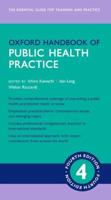Publisher's Synopsis
This Handbook illustrates how gender, ethnicity, age, and even sexual orientation and understanding influence the health practices and risk factors for health problems in diverse groups of people. Contributions from leading researchers in psychology, health, and epidemiology provide an interdisciplinary approach to the topic. In addition to epidemiological issues, this book discusses the view that public health policy and programs must be individually tailored to specific groups to maximize their effectiveness.
Part I deals with the effects of stress on the health of diverse populations. Part II of the book raises the issues of varied health risk factors and health practices for different cultural and socioeconomic groups. Part III examines specific health problems and issues common to women and men of varying ethnicity. The last section deals with the health problems of specific populations.
Featuring the latest information for understanding how diverse groups of people perceive and respond to issues relating to their health, this Handbook should prove to be a valuable resource to a wide range of practitioners and researchers in psychology, medicine, psychiatry, sociology, social work, nursing, exercise science, and counseling.










